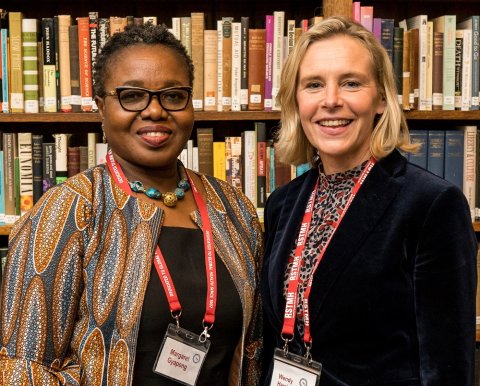International Women’s Day: Reflections from a female leader in health

This International Women’s Day, Dr Wendy Harrison, co-President elect at the Royal Society of Tropical Medicine and Hygiene (RSTMH) and CEO of Unlimit Health, reflects on her experiences as a woman in global health and gives some insights for future female leaders.
Women make up 70 percent of the health workforce globally and represent almost 90 percent of frontline health workers. Yet, they hold just 25 percent of leadership positions. As a woman in global health, this both saddens and angers me.
Not only is this inequitable, but it also prevents health policy decisions from being influenced equally by the priorities and experiences of all genders. It also significantly hampers the ability of health systems to deliver universal health coverage and undermines health equity.
I find this quote by Roopa Dhatt, Founder of Women in Global Health, very fitting:
Viewing women only as vulnerable populations or recipients of care means that they will not have the same level of ownership of solutions that is so crucial for many different types of interventions in health and other areas, to succeed.”
I have been fortunate to have held several leadership positions in my career in global health and recognise that this is due in large part to advantages and power denied to many women; I was well-educated, came from a middle-class white family and was born in an affluent part of the world. It is well documented that women from low- and middle-income countries (LMICs) often with extensive professional experience, face the greatest barriers to accessing senior posts nationally and globally.
I have experienced some of these barriers to a degree in my own career. When I held deputy roles, I was often been perceived as the administrator to the male leader, rather than a decision-maker in my own right.
Similarly, when I worked in clinical veterinary medicine, farming clients would often be reluctant to acknowledge me as having the ability to carry out work on livestock and would instead address male assistants, despite them not being veterinary surgeons.
However, it has become clear to me that it is important to acknowledge both the barriers but also the power you do hold in whatever form this may take; to ensure you use it not to consolidate your own privilege, but to genuinely support equity. It is important to remember that gender is only one dimension of equality, and that many women sit at intersection of several inequalities such as race, class, income, education, age, ability, sexual orientation, immigration status, and geography – all of which cause and sustain unequal health outcomes.
How exactly white women leaders in global health such as myself achieve this, is eloquently explained by Lazenya Weeks-Richemond, a friend, advisor and former colleague, in her blog post Dear White Women:
We do not want to be token-hires in your white-majority organizations. We want you to hire us based on merit and then allow us to sit comfortably at decision-making tables and share our expertise and personal insights to positively inform programming and policies”.
We also must acknowledge that the responsibility for more equitable and greater power balance lies with all genders. Everyone has a crucial role to play as allies in ending the systemic bias that favours men as the default health leader.
Finally, I leave you with a quote from the late Dr Mwele Malecela:
As scientists, a fundamental principle of our work is based on recognising and removing bias from our studies. And just as I believe in the scientific process, I believe in recognising and removing bias from our social and institutional processes. The importance of unlocking the potential of our female colleagues around the globe so they do not have to fight quite so hard to reach their potential cannot be emphasised enough, and I believe that the responsibility for doing that belongs to all of us.”